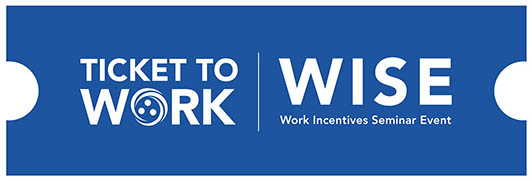You Asked, We Answer! Ticket to Work and Reasonable Accommodations

During our July WISE webinar, Ticket to Work and Reasonable Accommodations, the Ticket to Work (Ticket) team was joined by Sarah and Melanie from the Job Accommodation Network (JAN) to discuss reasonable accommodations and the Americans with Disabilities Act (ADA).
JAN helps people who are working or looking for work to think about accommodations that can help them succeed in the workplace. JAN also offers guidance on requesting accommodations for job interviews.
More than 450 people joined us for the webinar, and today we're sharing answers to the top questions you asked during the webinar. You can also check out the full webinar in our WISE archives.
What are reasonable accommodations?
Reasonable accommodations are changes to a job, workplace, or the way a job is carried out that allow an employee with a disability to perform a job for which they are qualified.
Accommodations can help you on your career path even before you've been hired. Under the ADA, employers must provide reasonable accommodations to employees and people who are applying for a job. That means you can consider and request changes to a job application process or an interview. Learn more about Making Interviews Accessible for You.
How can I request a reasonable accommodation?
There are 2 easy ways you can request a reasonable accommodation:
- Make your request in writing by using email or writing a letter. Having a copy of the request in writing can help you track the process of requesting and receiving an accommodation. JAN provides some tips in Sample Language for Accommodation Request Letters (askjan.org).
- Make your request verbally. Ask your supervisor or manager to talk with you privately to explain the situation.
A Ticket program service provider, like an Employment Network (EN), can also help you consider and request reasonable accommodations as you look for work and transition to the workplace.
Additional resources
- Make Everyday Adaptive Equipment, Tools & Services Count at Work
- Ticket Talk: Three resources for accommodations
- The (Low and No) Cost of Reasonable Accommodations
- Make Working from Home Work for You
Do I need to disclose my disability to an employer to receive
a reasonable accommodation?
Yes, you need to disclose that you have a disability for an employer to make reasonable accommodations available. Your employer needs to know:
- You have a disability;
- What your limitations are within the workplace; and
- What accommodation ideas you have to help you perform in the workplace.
While your supervisor or manager may need medical information, this information, including the disclosure that you have a disability, must be kept confidential by your employer. The information is shared only with people involved with supplying you the accommodation. You can learn more about disclosing your disability in Disclosure: Let’s Talk About It.
What options do I have if I've been denied a reasonable accommodation or am being discriminated against because of my disability?
As long as your employer provides an effective accommodation, they don't have to provide the exact accommodation you request. For example, you may request an assistant to read a skills test with you during a job application process, but the employer provides an audio recording of the test instead. Because the recording helps you take the test effectively, this would be considered a reasonable accommodation.
If your employer denies your request, ask why to help you decide what to do next. You may need to provide additional medical information about your disability. The accommodation may prove to be an undue hardship for the employer. You and your employer can work together to consider different options.
If your employer doesn't have a valid reason for denying your request, you can:
- Appeal the decision through supervisors and Human Resources;
- File a grievance with your union if you're a member of one;
- File a complaint with the Equal Employment Opportunity Commission (EOCC) or your state enforcement agency; or
- Seek legal support and advocacy support from a Protection and Advocacy for Beneficiaries of Social Security (PABSS) organization if you receive Social Security disability benefits (SSI/SSDI).
Ticket to Work
Social Security's Ticket to Work (Ticket) program supports career development for people ages 18 through 64 who receive Social Security disability benefits (SSI or SSDI) and want to work.
Each month, Social Security's WISE webinars share resources and tips for people with disabilities to help them find work and financial success. WISE webinars can help you stay informed about the Ticket program, new and existing resources that may help as you consider work, and specific employment topics. Our next WISE webinar, Ticket to Work and Work Incentives Part 1: SSI, will take place on Wednesday, August 23, 3–4:30 p.m. ET. Register today!
Learn more
To learn more about the Ticket program, visit www.ssa.gov/work. You can also call the Ticket to Work Help Line at 866-968-7842 or 866-833-2967 (TTY) Monday through Friday, 8 a.m. to 8 p.m. ET. Ask a representative to send you a list of service providers or find providers on your own with the Ticket program Find Help tool.